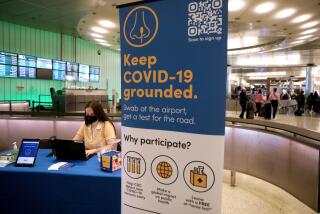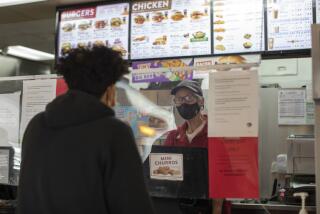Who pays if SARS worries lead to a changed itinerary?
- Share via
Although much remains unknown about the epidemic of severe acute respiratory syndrome, or SARS, in China and other places, one fact is apparent: The outbreak raises unique, vexing dilemmas for travelers.
Take the saga of Jan Schneider of South Pasadena.
In February she booked a three-week family vacation to China for July. After SARS hit the news a few weeks later, “we were prepared to hang on, hoping for the best,” she says.
On May 1 her husband’s company announced that employees returning from SARS-affected areas would be barred from work for two weeks. They could take the time as vacation or unpaid leave.
“That was the deal breaker,” Jan says. Her husband, Morris, faced losing two weeks’ pay because the trip would use up his vacation time.
The family decided to cancel the trip, not an easy task.
The company they had booked for a Yangtze River cruise wasn’t returning deposits but would apply them to another date if the Schneiders traveled by Dec. 31. But they didn’t want to go then because their son would be in school.
Access America, the company from which the family had purchased trip insurance, said it wouldn’t cover them for the cancellation.
The Schneiders faced losing $1,245 in deposits and insurance premiums. (They hadn’t yet bought their airline tickets.)
Their story raises several SARS-related questions and issues for travelers. Among them:
Can I change airline tickets without penalty? Get trip deposits back? The answer to the first is “Maybe, if you act soon”; to the second, “Probably not.”
Airlines have various policies. As of last week, United was allowing customers with tickets issued by May 5 for travel by June 30 involving Taiwan or Beijing to postpone travel without the usual change fees. You must notify United before the original departure date or by May 31, whichever comes first. Northwest set a June 1 deadline to make changes for tickets bought through May 8 for travel through Aug. 31 to China, Taiwan or Hong Kong; rebooked travel must be completed by Dec. 15.
Cathay Pacific set a May 31 deadline for changes on tickets from the U.S. to Asia bought by April 17 for travel by May 31; rebooked travel must be completed by Dec. 31.
Each tour company also has its own policy on customers who back out of trips because of SARS concerns. Many decline cash refunds of deposits (unless, of course, the company canceled the trip) but will let you apply them to a future trip. Some set a deadline, such as Dec. 31, for the rebooked travel.
If a cruise line declines to board you because of SARS concerns, however, you will likely get a refund. The International Council of Cruise Lines recently advised ships to deny boarding to passengers who had visited China, Hong Kong or Taiwan in the previous 10 days, regardless of whether they show symptoms.
Does my trip cancellation insurance cover me? Probably not. Such policies typically exclude epidemics as covered reasons for canceling a trip. They also typically won’t pay based on a change in personal plans -- that is, if a person decides not to take a trip, even if that decision is based on fear of travel.
Jan Schneider said “epidemic” was No. 13 on a list of 16 exclusions in her 21-page policy from Access America. When she bought the policy, she was worried about terrorist attacks -- “they had a whole section on that” -- and was relieved to find that situation was covered, within limits, of course.
Beth Godlin, senior vice president at Access America, told me that in a case like the Schneiders’, the reason to deny the claim is that the policy excludes business reasons; the Schneiders canceled their trip because of an employer’s policy.
What are my obligations to an employer?
The federal Centers for Disease Control and Prevention, as of last week, was not advising businesses to quarantine people returning from SARS-affected areas. Such travelers should monitor their health for 10 days but “need not limit their activities and should not be excluded from work, meetings or other public areas, unless fever or respiratory symptoms develop,” according to the CDC’s Web site, www.cdc.gov/ncidod/sars.
This advice is based on the theory that SARS has about a 10-day incubation. Although there is no test that provides early diagnosis of SARS, there is also no evidence that people can spread it before they show symptoms or that casual contact such as occurs in a workplace poses that danger, CDC spokeswoman Karen Hunter said last week.
Nevertheless, some employees and employers remain nervous about the unknown.
In dealing with SARS, businesses face a delicate balancing act between rights and responsibilities, says lawyer Frank Cronin, a partner in Snell & Wilmer in Irvine who advises management on employment law.
On one hand, under Occupational Safety and Health Administration rules, businesses must provide a safe workplace, he says. On the other hand, federal laws require them to “reasonably accommodate” someone with a disability.
Cronin suggests that, for employees who return from SARS-affected areas, a doctor should be asked whether the worker can return to the office. If the answer is no, the employee should be offered a paid two-week leave. Putting such employees on unpaid leave may raise discrimination questions, he says.
“We’re just guessing,” he says of such advice. “In these new areas, the law usually catches up a year or two later.”
Other options may be a separate office or working at home, says Don Sessions, an employee rights attorney in Mission Viejo.
As for the Schneiders, it looks as though they’ll be getting some money back. Last week their travel agent said the cruise operator had relented and would return their deposits.
Meanwhile, they’re planning to stay in the U.S. in July, maybe making a coast-to-coast car trip.
As for the insurance policy, Jan says she has resolved in the future to “read even more carefully than I did and consider the crazy things that might happen.”
Jane Engle welcomes comments and suggestions but cannot respond individually to letters and calls. Write Travel Insider, Los Angeles Times, 202 W. 1st St., Los Angeles, CA 90012, or e-mail jane.engle@latimes.com.
More to Read
Sign up for The Wild
We’ll help you find the best places to hike, bike and run, as well as the perfect silent spots for meditation and yoga.
You may occasionally receive promotional content from the Los Angeles Times.






